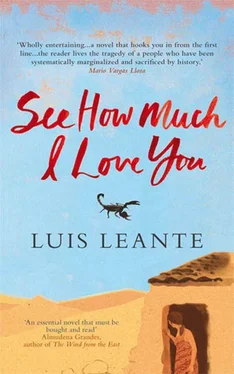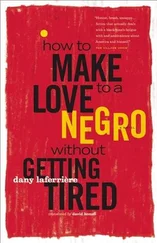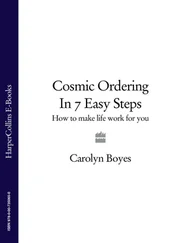‘My friend, my friend,’ she says, in Spanish. ‘You have baraka , my friend. I assure you of that.’
The presentations take nearly an hour. Aza introduces her to all her family in Edchedeiria. Montse introduces Layla. The two women talk for quite a while in Hassaniya. Brahim, who has stayed outside, is soon chatting to the neighbours. He seems to know everyone. The women of the household offer Montse some tea, and bring her perfume for her hands and face. The girls present her with necklaces, bracelets, and wooden rings with pretty decorations. She lets them fête her. Layla speaks with everyone as if they’d known each other for years.
‘You didn’t tell me you had a boyfriend who was a legionnaire,’ says Layla after listening attentively to the others.
‘You didn’t ask,’ jokes Montse, laughing. ‘But it doesn’t matter, really.’
Aza and Layla smile. Montse feels it’s the right moment to talk about Santiago San Román. But, at the same time, she’s embarrassed about making her story so public. After all that’s happened, everything to do with Santiago feels very remote.
‘I think I’ve found the man you spoke of,’ explains Aza, waiting for Montse’s reaction. ‘Other Spaniards like him settled here, but most have died, or gone to Mauritania.’
‘It seems my story made an impression on you. After all we’ve been through, you haven’t forgotten what I told you.’
‘Not a thing. My mother helped me. She’s very old, but has a good memory. She put me on the right track.’
‘I’m not so sure I want to see him now.’
Layla and Aza look at each other, disappointed at the Spanish woman’s reaction.
‘Are you out of your mind?’ says Layla reproachfully. ‘Now you have to find out whether he’s been thinking of you all this time.’
Montse smiles. She has the impression the two Saharawis regard all this as a soap opera.
‘Fine,’ says Montse, ‘tell me what you know.’
‘In Ausserd there’s a Spanish man who fled with the refugees. He used to be a soldier, and now lives in La Güera, like me.’
‘Do you know his name?’
‘Not his real name, no. But I think they call him Yusuf or Abderahman, I’m not sure.’
‘Have you seen him?’
‘I’ve met him, but I didn’t know he was Spanish. He looks like one of us. I haven’t seen him for a long time, though. His children attended my school.’
‘Are you a teacher?’
‘Yes.’
‘What other surprises have you got in store for me?’
Aza goes quiet and smiles. Layla clicks her tongue.
As they travel through a hammada without paths or roads, Montse wonders what might move a man who wasn’t born in the desert to be anchored for so many years in this part of the world. The beauty of the landscape and the generosity and hospitality of the Saharawis do not seem reason enough. Neither does love.
Brahim drives in silence, with his hands on the top of the wheel. The three women have squeezed together in the cab of the pick-up. It feels like a lengthy journey, with the difficulty of the terrain. La Güera is no different from the rest of the camps. Amid the dairas one can see the two white buildings where the school is. They look like ships stranded at the bottom of a dry sea. Aza gives directions to her house. They welcome them pretty much as they had in Edchedeiría. Aza’s mother is an old, nearly blind woman. She speaks Spanish as if she were salvaging it from the depths of her memory. At once she sets everything up to look after her guests. Presently Brahim strikes up a conversation with the men. Montse knows she’ll have to wait for the rite of hospitality to be over before asking after the Spaniard who lives in La Güera, so she doesn’t say anything yet.
They eat with the whole family. Brahim has been invited to the neighbours’ jaima . In the course of the meal, Montse learns more about Aza and her family. Her father was once the mayor of the old Villa Cisneros, and a member of parliament at the Cortes Españolas. When Morocco and Mauritania invaded, he was taken prisoner by the Mauritanians. Aza was a child back then. They spent more than ten years in the country. Eventually they were allowed to go, along with the rest of the Saharawis, to the Algerian hammada . Aza’s mother recalls her dead husband with contained emotion. Then she explains to her daughter once more where to find the man they’re looking for.
Montse is very nervous. Her food feels stuck in her throat. At times it all feels like a dream. She has imagined a possible encounter with Santiago San Román many times, but not at all in the way it is happening now. Suddenly, a Saharawi steps aside from the group of men talking to Aza, offers Montse his hand, and greets her in Spanish, with a strong Arabic accent. He’s wearing a black turban and a blue derraha . His skin is as dark as any Saharawi’s. His eyes are red like theirs, and his teeth are tea stained. His gaze is as piercing as that of the men from the desert. It’s hard to judge his age, like most Saharawis after thirty. Montse feels that the hand which squeezes hers is actually burning. Aza speaks to him in Spanish, and he replies in that language and sometimes in Hassaniya.
‘Yes, I’ve been a legionnaire,’ he tells Montse. ‘But that was many years ago.’
Montse is almost certain that the man cannot be Santiago San Román, but when she looks him in the eye she wavers.
‘My name is Montse. They told me about you, and I didn’t want to leave without saying hello.’
The man is obviously very flattered. He smiles. He finds the foreigner’s attitude a bit strange. He invites all three women to drink tea at his house. Layla excuses herself, explaining they should be getting back to Smara. The man insists. Now Montse is sure it’s not him. But she cannot help asking:
‘Did you know a young man called Santiago San Román? He was a soldier like yourself.’
The man thinks for a moment, tipping his turban slightly backwards. Under the cloth appear a few grey hairs.
‘I’m not sure. There were thousands of soldiers like myself. He must have gone back home when he was discharged. I stayed.’
‘He stayed too.’
‘Some died or were taken prisoner,’ the man explains, smiling all the while.
Montse knows this is leading nowhere. But deep down she’s relieved not to be in front of Santiago San Román. It’s a paradoxical feeling.
On the way back, Brahim drives more slowly. Aza has stayed back in La Güera. Montse has promised to visit her at the school in a few days’ time. She and Layla are both silent. The sun is setting at their back. Little by little the sky turns a deep red that takes Montse’s breath away. When they are near Smara, she asks Brahim to slow down. She wants to preserve the beauty of that sunset in her memory. Layla seems indifferent to it. Suddenly she points something out to Montse. A few metres from the tracks, a dromedary lies on the ground, dead. It is a vision that makes a deep impression on the foreigner. Montse asks Brahim to pull over. He does so without replying. Intuitively, he can guess the kind of feeling a sight like that might give rise to in a European woman. In the distance, one can see the jaimas of Bir Lehlu.
There in the desert, the body of the dead dromedary is like a red brushstroke on a white canvas. Montse cannot look away. There are no flies, no carrion-eating birds. Brahim smokes leaning on the pick-up and the women stand a few metres away from the carcass. There isn’t even a bit of wind that might profane the silence of the evening. Layla tries to understand what it is that so captures her friend’s attention. Montse looks into the horizon. In the middle distance, on a slight elevation, some rocks stand out in profile.
Читать дальше




![Ally Carter - [Gallagher Girls 01] I'd Tell You I Love You But Then I'd Have to Kill You](/books/262179/ally-carter-gallagher-girls-01-i-d-tell-you-i-lo-thumb.webp)







